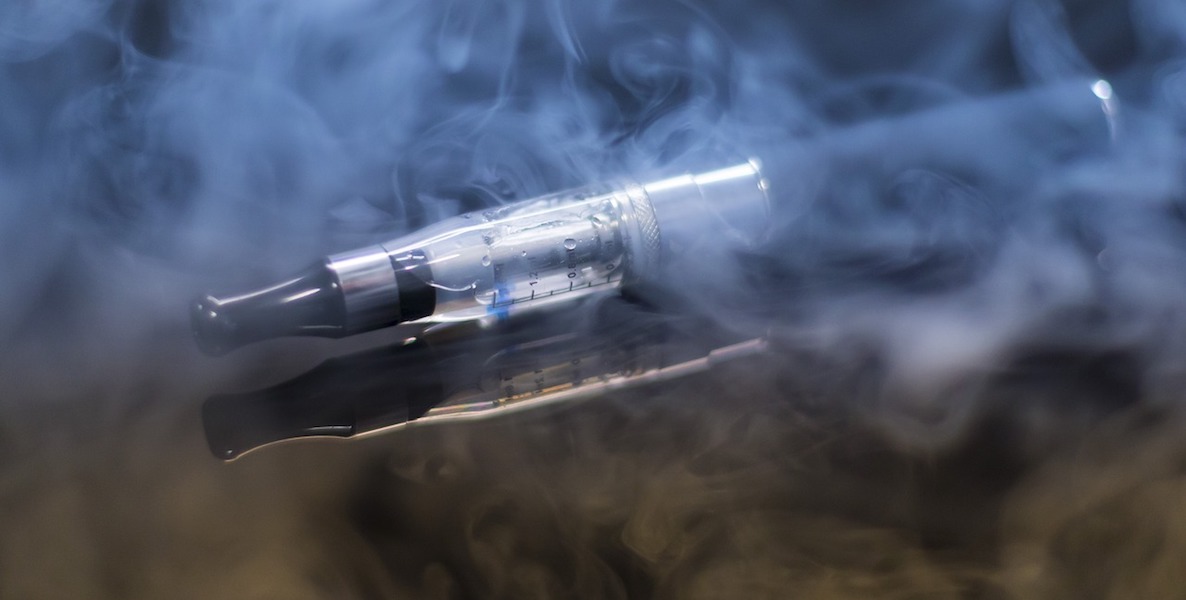I want to start by saying this: Vaping looks dumb. In the realm of things that you can do to yourself publicly and voluntarily, it’s right up there with getting a face tattoo or gauges. It’s pretentious and disruptive. But I can think of another socially acceptable thing that you can do that’s dumber.
And that thing is smoking.
Be Part of the Solution
Become a Citizen member.You probably don’t need me to run down the stats about smoking, because many of you have likely lost a loved one to a nicotine addiction. But I’ll do it anyway, because every anti-smoking column needs some grand guignol. In 2011, the last time the CDC catalogued smoking information in the state, 22.4 percent of Pennsylvanians admitted to consuming tobacco in cigarette, cigar or dip form. The grimmest fact of all, and the most pitiful: Lung cancer, largely caused by tobacco addiction, is the leading cause of cancer mortality in Pennsylvania.
Vaping and e-cigarettes represent the last, best hope for many smokers who find it nearly impossible to break their chemical dependency on nicotine. Smokers who switch to vaping and e-cigarettes are making a very healthy choice: A long-term study, completed this year by Cancer Research UK, found that e-cigarette smokers had 97 percent less NNAL in their systems than cigarette smokers —NNAL being one of the carcinogens linked most with smoking-related cancer.
But in Pennsylvania, the business of vaping is taxed at a perplexingly high rate. As recently reported by Philly.com, the inventory tax rate placed on Pennsylvania vape stores has literally put 25 percent of vape shops open in this state out of business. Pennsylvania vape shop inventories are taxed at an astonishing 40 percent; Philly shops have to pay that 40 percent tax plus local cigarette and business taxes. Since the implementation of the tax, it has raised nearly $14 million in revenues for the state.
To a degree, I understand the utility of the tax. After all, there are studies that show that kids who start vaping at a young age are more likely to eventually begin a cigarette habit. That said, state legislators seemed less focused on the morality of a vape tax, and more on the fact that such a massive tax could help to offset the annual budget deficit; other taxes that got a major bump in 2016 included liquor, gambling and tobacco. There are virtually no legislators on record as saying that they’re targeting the vape industry because it’s dangerous. Rather, vape taxes were quietly rolled in with true sin taxes last year.
Vaping stores are small businesses, owned by the type of people we say we want in this city—young entrepreneurs. Already, those businesses are overburdened when it comes to taxes. Philly regularly ranks among the most business-unfriendly cities in the country; in 2014, thumbtack.com, a small business connector, gave Philadelphia a grade of “D” when it came to business friendliness, as part of a joint study with the Ewing Marion Kauffman Foundation (more recently, they were awarded a C+; not exactly Ivy League material). Getting a business off the ground in Philly is difficult as is, between licensing and regulations. For vape shops, that’s compounded by introducing a new product to people—and by a crushing tax.
For many, vaping is a medication. I doubt there’s a single person reading this piece who doesn’t wish that they, or someone they care deeply about, had the facility or intention to vaping instead of inhaling death sticks. If I had my way, we’d have government-sponsored pro-vaping and e-cigarette campaigns in every city and in many rural areas.
Vaping stores are small businesses, owned by the type of people we say we want in this city—young entrepreneurs. Already, those businesses are overburdened when it comes to taxes.
I’m no tax-illegalizing right-winger. I’m not going to demand Pat Toomey lead a charge to defund the government until full smoking rights are returned to dingy bars around this country; to an extent, I believe that your freedoms begin to end when you put others in harms way, via second-hand smoking. I have people in my life who I wish had the ability to break their addictions; I myself am probably dangerously fond of smoking cigars.
But in the vaping business, I also see an industry that has many people who care about improving the lives of others, who have lost family members to a vile addiction, who are small business owners trying to make a living and a contribution to their community.
A 40 percent inventory tax means that vape stores are less likely to open in areas that can’t sustain high volume buying, or have less expendable income. This means that poorer Philadelphia neighborhoods, as well as towns across the state, are choked. You don’t need to take my word for it. Just take a look at a map of vape shop locations in this city. There are no vape shops in Germantown, Strawberry Mansion, Kingsessing, Frankford, West Kensington or in pretty much all of North Philly.
According to the CDC, the primary demarcation of a likely smoker is whether or not he or she is below the poverty level, or has a high school education. And of course smoking is still popular in lower income neighborhoods, and also similarly taxed—in Philadelphia, cigarettes are taxed by the state and by the city, making cigarettes around $9 a pack.
But the addiction has worked its way into the bedrock of poor communities, and cigarettes will always be in demand. Vaping, on the other hand, has not been given a chance to win over the hearts and minds of folks in poorer neighborhoods—even though it is cheaper and safer. And with a 40 percent inventory tax, it ain’t gonna happen.
“One thing I hear a lot is people saying ‘I couldn’t get nothing [vape juice] out there, so I ended up buying cigarettes;’ they couldn’t find coils for their devices, that kind of thing. It happens a lot,” says Shane King, who helps run Philadelphia’s Love Vape vape shop.
The inventory tax rate placed on Pennsylvania vape stores has literally put 25 percent of vape shops open in this state out of business. Pennsylvania vape shop inventories are taxed at an astonishing 40 percent; Philly shops have to pay that 40 percent tax plus local cigarette and business taxes.
According to King, a substantial portion of Love Vapes’ clientele comes from folks who are trying to kick the habit. King’s got a special affinity for them—he lost his mom to smoking-related lung cancer.
“People come in and try to buy vapes for their grandma all the time,” says King. “That’s how it is a lot of the time. It’s often someone trying to introduce a friend or a girlfriend to it. I hear success stories all the time. I know people who were smoking like three packs—couldn’t leave the stuff alone—and they started vaping, and just got into it. I’ve seen people who are smoking three packs a day end up not smoking at all. A lot, a lot of people.”
Kill the 40 percent inventory tax. Let the vapers vape. And let the record show: when the great vaper revolution washes through the streets of this wicked city, I was technically on your side, guys.
Header Photo: Pixabay



